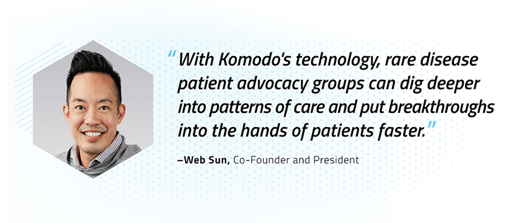Collaboration Continues to be Key in Moving the Needle on Rare Disease

Henry Ford said "Coming together is a beginning. Keeping together is progress. Working together is success." Rare disease research is no exception, where collaboration between technology and grassroots movements has been the key to many scientific breakthroughs. Patient advocates have often spearheaded the use of new tools to connect data points, unlock new opportunities for research and development, and successfully lobby policymakers. But with more than 7,000 rare diseases — which affect as many as 1 in 10 Americans — it's clear that a more sophisticated approach to data, technology, and analytics will be needed to scale efforts and address the unmet needs of these patient communities.
Unlock new insights about patient journeys with Komodo’s Healthcare Map

High need, high impact: reducing the burden of rare disease
Traditionally, with so few patients dispersed across the globe, rare diseases have been notoriously challenging to identify. Their appearance is rare in the average doctor’s office, and symptoms can be common or nondescript, leading practitioners to mistake them for signals of other conditions or for psychosomatic issues. Researching these diseases is complicated by challenges of limited and siloed data, variability in clinical definitions, procedures, and regions, and barriers to patient recruitment and identification.
Endpoints in research are largely unestablished, and most do not even have their own ICD code, complicating disease-specific research of relevant patient cohorts. The resulting lack of reliable trial results make for inflated R&D costs and timelines, and slows progress for patients and their families, leading to a higher burden of disease. By one estimate, patients in the U.S. spend roughly 6 years and 7.3 doctors on average before their disease is correctly identified.
This is why Komodo Health is empowering rare disease patient advocacy organizations in the Chan Zuckerberg Initiative’s Rare As One Network (CZI) with data-driven resources and intelligence to build a model for tackling rare diseases. The ~50 patient-led organizations will now have access to Komodo Health’s high fidelity data and analytics firepower, offering an unprecedented capacity to scale their efforts and accelerate their progress in rare disease research, diagnosis, and treatment. The insights derived from Komodo’s Healthcare Map™ — which tracks the longitudinal journeys of more than 330 million de-identified patients in the U.S. — can also be woven into resources and educational materials for advocacy partners to support patients and providers in their treatment planning.
 This isn’t the first time that Komodo Health’s offerings have been used to overcome these traditional barriers in the rare disease space.
This isn’t the first time that Komodo Health’s offerings have been used to overcome these traditional barriers in the rare disease space.
- Our Pulse predictive alert system and Healthcare Map were used to identify signals consistent with diagnosis of the rare metastatic renal cell carcinoma. Patterns and trends in patient histories were then used to predict the likelihood that a provider would see a new patient with the condition within the following eight weeks.
- Janssen Research & Development, LLC is using our software to optimize feasibility, site selection, and patient recruitment for clinical trials in several therapeutic areas including several rare diseases, ultimately driving higher throughput for trials and getting life-saving therapies to patients faster.
- Our analytics allowed another client to connect patients with a rare liver cancer (cholangiocarcinoma) to multidisciplinary specialist providers, and to identify referral patterns and diagnosis codes. This allowed for the creation of a nationwide database of specialists, and systems to proactively spot and address gaps in care.
Unlocking new potential in rare disease treatment
The rare disease space — and the diagnostic odyssey that so many patients undergo — is ripe for advancements with the advent of deeper, more nuanced views into patient journey data, coupled with advanced analytics. This can help identify symptoms sets, signals, and patterns of disease even before a diagnosis is made, building understanding of disease epidemiology and progression in a privacy-safe, de-identified manner. Misdiagnoses can be flagged, and strong predictions can be made about when and where an undiagnosed patient may show up first.
There is also the opportunity to make vast improvements in clinical research, by pinpointing more patients at specific stages of disease progression and by identifying suitable study investigators and endpoints. New levels of precision can support the shaping of new R&D pipelines. On-the-ground therapeutic efforts can also be supported with highly connected provider data to identify rare disease experts and pinpoint the most potent geographic and time-bound points of impact for educating and liaising. In short, collaboration between advanced technologies and patient advocacy groups will likely be a game changer for reducing the burden of rare diseases.
Read more about how Komodo is powering rare disease research in “Data-Driven Strategies to Power Every Stage of the Orphan Drug Lifecycle”.
To see more articles like this, follow Komodo Health on X, LinkedIn, or YouTube, and visit Insights on our website.







